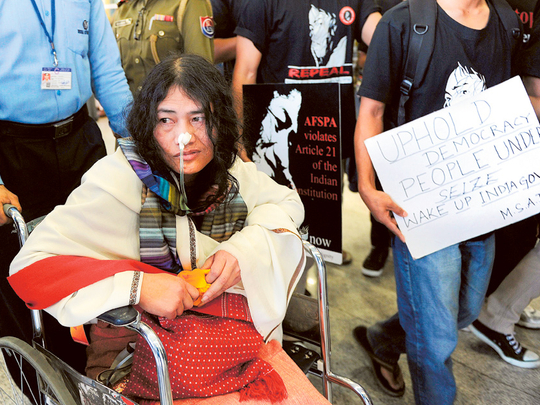
New Delhi: An Indian human rights activist who has been on hunger strike for the last 14 years in protest against alleged army atrocities on Wednesday walked free from a prison hospital where doctors had force fed her to keep her alive.
Irom Sharmila’s release comes after a trial judge found no evidence to support charges filed in 2000 by prosecutors in the northeastern state of Manipur that she was trying to commit suicide by refusing food.
“It is hard for me to believe that I am free now. My battle against injustice and crimes committed by the army in Manipur will continue,” Sharmila told Reuters by telephone as she waited to leave the hospital in state capital, Imphal.
Answering a question, she said she would continue her hunger strike. Sharmila’s lawyer, Babloo Loitongbam, confirmed her release.
The 42-year-old, known as the Iron Lady of Manipur, began her fast in November 2000 after 10 people were killed in a shooting at a bus stop near her home in Manipur, a remote state that borders Myanmar.
Activists blamed the killings — including two children — on the army. Police registered a case but no arrests were made.
Despite calls from judicial inquiries and human rights groups, the federal government has kept in force a draconian anti-terror law that gives soldiers virtual immunity from prosecution in regions hit by insurgencies.
Shocked by the failure to bring those responsible to justice, Sharmila started her hunger strike, vowing only to end it when the law was repealed.
In response to Sharmila’s protest and growing popularity, state prosecutors charged her in 2000 with attempting suicide — a punishable offence in Indian law which also outlaws assisted suicide.
Sharmila was held in a state hospital and force-fed by tubes several times a day.
Her release is expected to rekindle debate over the Armed Forces Special Powers Act (AFSPA), which is in force in parts of northeastern India and the northern state of Kashmir that have been affected by years of separatist violence.
The law gives security forces powers to search and enter property and shoot on sight. The military says the law is needed to tackle insurgents and that it investigates allegations of abuse made against soldiers.
“There has been no instruction from the state government to challenge Sharmila’s release order. She can walk out of the hospital as a free citizen and maybe even continue her hunger strike,” S. Indira Devi, a government appointed lawyer involved in the case, told Reuters.












